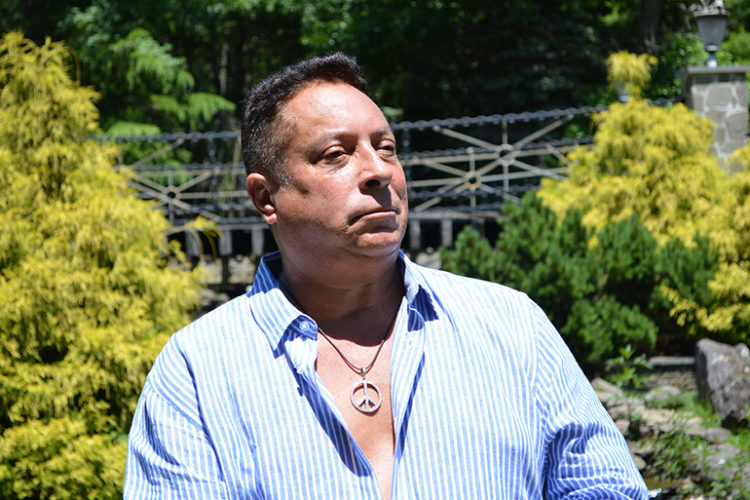My Hamptons: Sir Ivan, Philanthropist, Recording Artist, Superhero
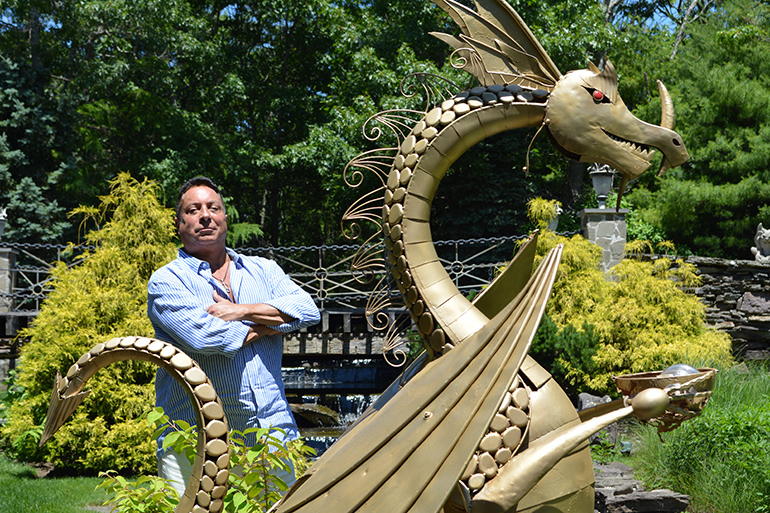
Water Mill castle lord, recording artist, philanthropist, reality television star and real-life superhero Ivan Wilzig has had several names over the years. Whether he’s donning colorful suits with matching bejeweled capes to perform electronic music as Peaceman, or honoring the legacy of his Auschwitz survivor father Siggi B. Wilzig as Mr. Mitzvah on Stan Lee’s Who Wants to Be a Superhero?, or going by his preferred moniker, Sir Ivan, the multimillionaire has always used his substantial wealth to help others through charitable works, and to support his lavish and theatrical lifestyle born from childhood dreams and Hollywood movies.
Sir Ivan’s 15,000-square-foot castle off Deerfield Road in Water Mill and the infamously decadent theme parties he’s hosted there since 1998 have become the stuff of legend–true spectacles attracting a long list of celebrity guests and capturing the imaginations of those left outside his massive gates. Recently, Sir Ivan welcomed Behind the Hedges to the castle, offering a look inside his one-of-a-kind home and the life well lived within its walls.
The Billboard-charting dance-pop artist opened up about his early visits to the East End; his father’s meteoric rise in American business after surviving the Holocaust and the upcoming book about his life; his mother’s erotic art collection; giving back through his Peaceman Foundation; why he built the castle that’s synonymous with the name Sir Ivan in the Hamptons; and how he broke free of the conservative banker’s life that did nothing for his artistic soul.
This is the unabridged interview, as noted in the August 2, 2019 issue of Behind the Hedges magazine.
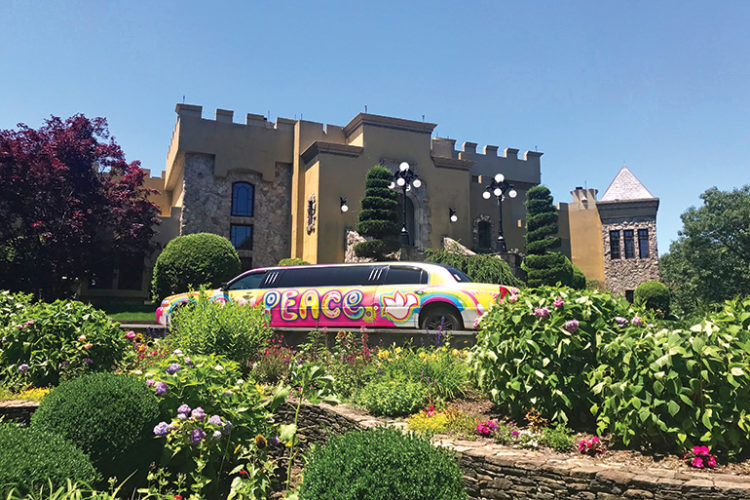
When did you come out here, to the Hamptons?
In 1974, after my first year in college, I had some Long Island friends who told me about the Hamptons. I decided to come out with my best friend at the time and explore the situation. My father hadn’t achieved the success he had at that point. It just was a dream world. If there was a giant estate you couldn’t see from the hedges, for fun we would pretend we were lost and drive all the way down somebody’s driveway, go to the front door and say we’re lost. All we wanted to do is see this magnificent home.
Not knowing the cool beaches to go to, and not knowing the cool nightclubs to go to, we started off in Westhampton and went to every single beach all the way down to Montauk–this is in one weekend. Then, at night, we went to every single nightclub from Montauk all the way back to Westhampton. So we take this trip back and forth, all the way from Westhampton to Montauk, and Montauk back to Westhampton. We were so tired from driving and from this grueling research project we were doing. We finally took a motel in Amagansett–that’s where we unpacked and checked in. Then we found out after all our research that the best nightclub was Marrakech in Westhampton and the best beach was on Dune Road, also in Westhampton, Morgan Beach. So it’s funny, we unpacked in Amagansett and now we’re driving back to Westhampton during the day to Morgan Beach, going home to change and shower, and the other one of us would drive back at night to go to Marrakech. We realized next time we come out here we can just go to Westhampton because that’s where all the action is.
Your father found his success in the 1980s then?
The ’70s and ’80s is when he took over an oil company on the American Stock Exchange, and then he used that oil company to take over a commercial bank in New Jersey on the NASDAQ, and then he grew an empire with many companies in between. The book has been written and I already have an agent for the TV and movie rights. I didn’t write it, I hired an author [Joshua M. Greene]. It’s taken six years, and I’m about to turn it over to the publisher. Right now, the working title, which I expect will be the final title, is Siggi’s Triumph: From Nazi Nightmare to the American Dream.
[My father survived] two years in Auschwitz, two death marches and six months in Mauthausen where he was liberated on the last day of the war. It’s an absolutely incredible story, and the book came out beyond my wildest expectations. It really captured the essence of the man.
We’ve been working on it for six years, interviewed almost 100 people and the fact checking took a long time because when you do a Holocaust book, with all the Holocaust deniers in the world, you have to make sure it’s accurate because they’re just looking for something to say, “You lied here, now the whole thing is a lie.” It takes an awful lot of time to make sure what you’re saying is absolutely true, that the dates are right, etcetera, etcetera.
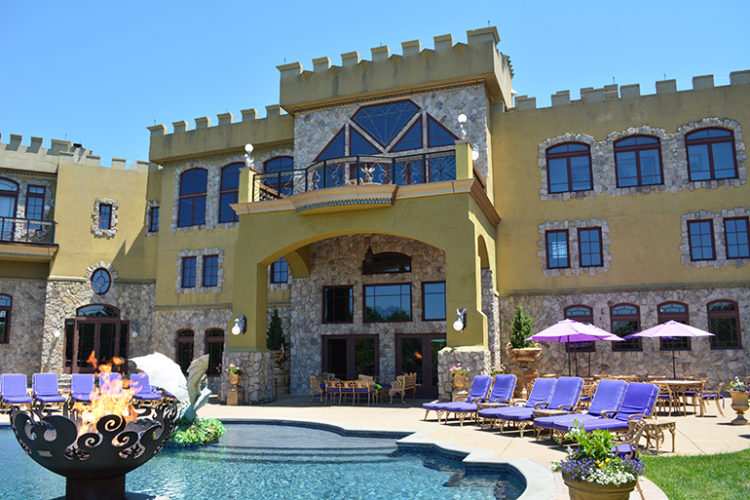
Tell me about your house. Did you always dream about being the king of your own castle?
Well, it was an evolution. We started in Westhampton renting homes, then we moved to Quogue and bought our first home. And then, while the castle was under construction, we spent one summer on Flying Point Road in a little beach shack, and that was the amazing accomplishment my brother [Alan Wilzig] got done.
Instead of spending another fortune in rent for another beach shack on Flying Point Road, the challenge was to get it open before Memorial Day weekend so we wouldn’t have to do that again. And he did it. When I came here, it was the most unbelievable thing. It looked like an ant colony. There were at least 100 workers and subcontractors all working at the same time to get it done for the Memorial Day deadline. You had marble men, you had pool men, you had stereo men, you had electricians, you had plumbers–everyone you could think of was trying to get their part of it done before Memorial Day, and they did. We bought the land in 1997 and moved in for the first summer in 1998.
It took 18 months to design, build and decorate the entire place. People said they were amazed how we could do that because a house this size, anybody will tell you, takes between three and four years to build and decorate. But what they did was so clever. All the antiques, all the furniture, all the fixtures–everything that was going to furnish each room–they bought in advance and put in a warehouse so that the minute we got our C of O, a caravan of trucks brought everything out and each room was fully decorated. That’s how we got it all done in 18 months.
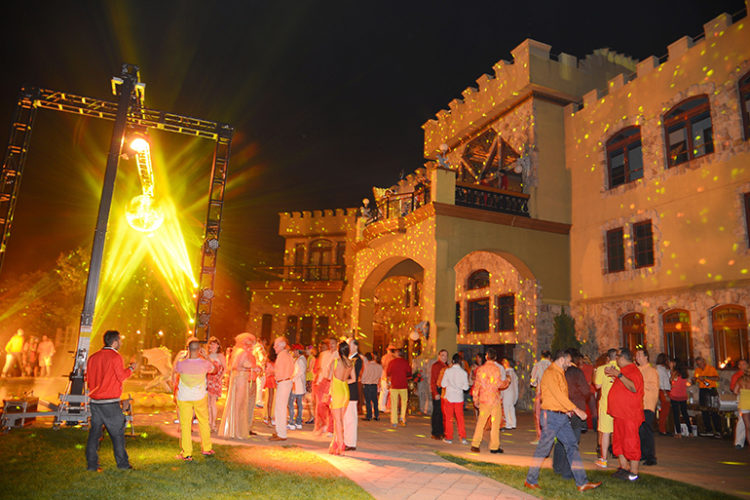
The entire Hamptons found out about it because everybody was wondering, who are these two single guys from New Jersey that just built this unbelievable castle? The whole who’s who of the Hamptons came to our first party, which was the Jungle Masquerade Ball to benefit the rainforest.
Ivana Trump came with her boyfriend at the time, he owned a Ferrari dealership, and Donald Trump was here with Sammy Sosa while the home run battle was going on between him and Marc McGuire. I know for a fact that Trump and Sammy Sosa flew from here, that party, to Manhattan for Jennifer Lopez’s birthday party afterward. It was a kind of cool thing.
It created such a buzz that everybody wanted to see it, taste it, feel it. I’ve had everyone from RuPaul, who was my first celebrity guest who slept here, to Mike Tyson, so that just shows the diversity of people who wanted to see the castle and meet us. When you go from RuPaul to Tyson, you know you covered all your bases. It was very funny.
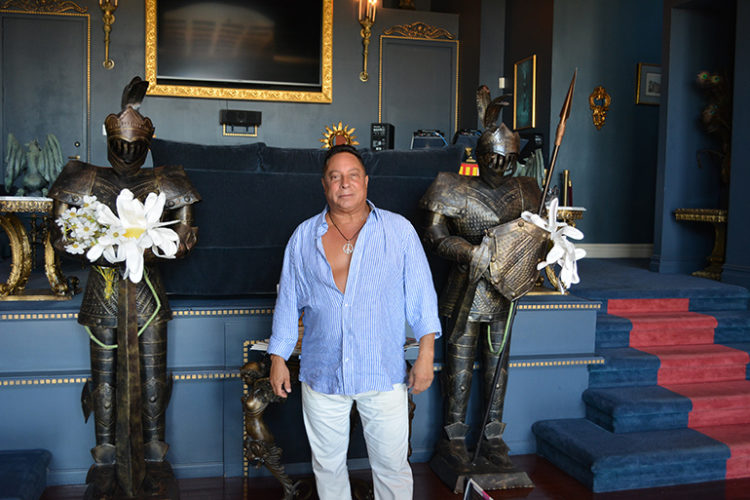
But why build a castle?
That was solely my choice. My brother deserves all the credit for the decorations, the furniture, the colors, the carpeting, the furnishings–he built it. I told him what I wanted and he ran with it. I had been fascinated as a child with Robin Hood, William Tell, King Arthur, Merlin the magician, anything having to do with knights–the good knight, the black knight–that whole period of time fascinated me, and the castle, in almost every Hollywood movie that I liked, was the epicenter of life. The castle was almost a city. It was self-contained and everything you wanted was inside it, because it was protected. You didn’t have to leave.
My brother was leaning towards a Mediterranean villa with those copper roofs, the red roofs, the clay, and I said, “Nope, it has to be a medieval.” It was quite extraordinary. Many of the things, he and his then-wife did by hand, in terms of painting medallions and working on a lot of the restoration and the crown molding and things like that, they actually did themselves.
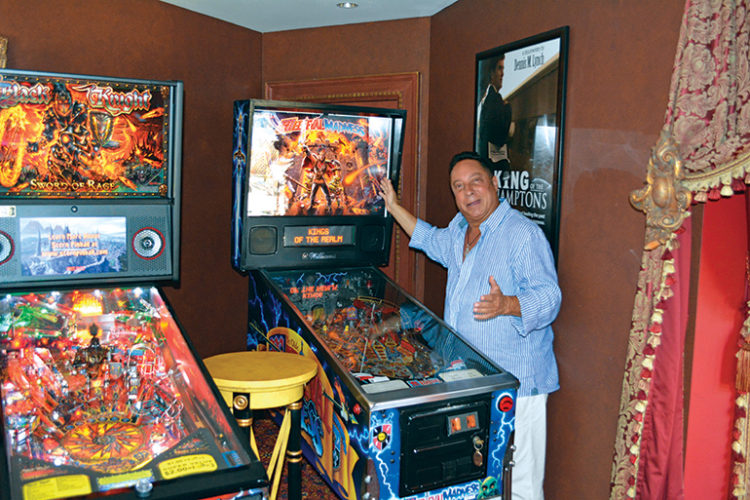
Does your brother Alan come here anymore?
We were 50/50 partners the first 10 years. The last 10 years and more I’ve owned it myself. When he decided to get married and have children, I decided to buy him out. But what makes the home so unusual is that, since it wasn’t built by a couple or for a family, it has two master bedrooms, two master bathrooms, two master closets, both with wraparound balconies, at each end of the castle. He basically had his tower and I had mine.
Calvin Klein owned a castle, Dragon Head, in Southampton.
They ripped it down and made a modern house out of it. People used to mix that up with my house. Mine’s not on the ocean. I used to give them the history of it. It had different names. I was shocked when I heard that [it got torn down]. I haven’t been to Calvin Klein’s house, but I have friends who have. They say it’s very nice, but it’s probably just a modern cube. I snuck into that castle. It was under construction. I said, I’ve got to get a look and see what that house looks like on the inside, and I went in and I saw this 20-foot waterfall inside with a rock formation and a seven-and-a-half-foot hammerhead shark.
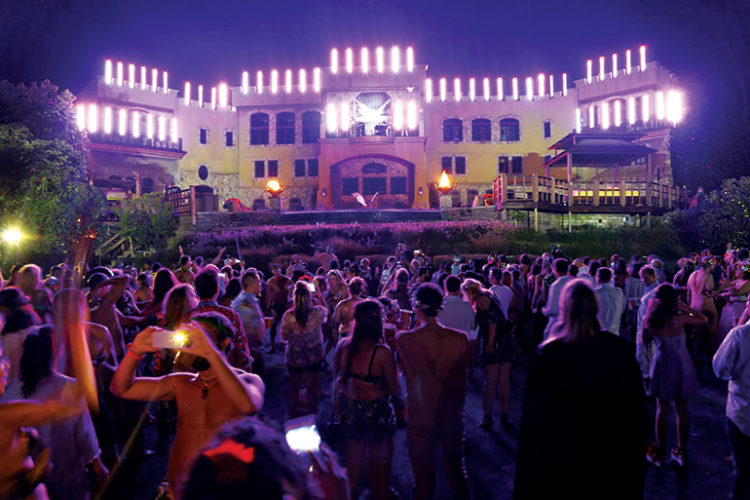
You ever have people try to sneak in here?
You have to risk a lot of deer ticks to take a sneak peek here. You can get a little glimpse through the gates, but not much.
Do you have a favorite restaurant out here?
I’ve had my own chef almost every year I’ve lived here, so I’ve never wanted to deal with the weekend waits for reservations and getting a table in a loud, noisy place where maybe the service isn’t that hot, even though the food might be great. So, I try a different one every time. Having my chef I’m inviting people for dinner. I’m inviting people for barbecues.
What inspired you host such incredible parties here?
For 20 years I worked in a bank with my father, wearing pinstriped suits and carrying a briefcase and wearing a tie. Once the bank was sold and I became a recording artist doing electronic dance music…I just let loose in general, my style of dress, wearing capes when I performed as Sir Ivan aka Peaceman, and the parties, too. I always dreamed of being an entertainer, a singer, dancer and actor. But having given up my younger years to work in the bank with my father the Holocaust survivor, because he wanted his family close and tight-knit under his wing, they were pretty much left as hobbies–the singing, the dancing and the acting–and it was only after the bank was sold that I was able to do it professionally and successfully.
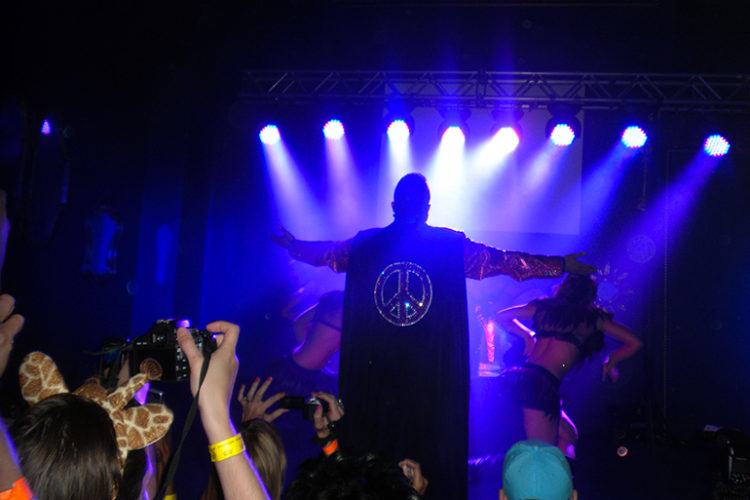
Was your father a very serious guy?
Yeah, he had no interest in a wannabe singer son, a wannabe dancer. He just thought I was a dreamer, unrealistic, not practical. He used to say, “You’re never going to be able to feed a wife and kids playing guitar in Central Park for nickels and dimes,” like most aspiring singers are. “You don’t come from a show business family, you don’t have any connections, you don’t live in L.A.,” so he was very much against it.
First he tried to bribe me with the longest list of perks you can possibly imagine for me not to become a singer and to go to law school and work for him in the bank. And when the bribes didn’t work, he thought of a long list of threats, and he came out with these threats. And when that didn’t work, and I got a job as a waiter in a restaurant in New York to show him how serious I was, he couldn’t take it. Here I am, I graduated an Ivy League school, I graduated Cardoza Law School, and [he’s asking] “What’s Ivan doing these days?”
[I’m] working as a waiter, trying to become a singer in New York. So he couldn’t handle that and used my mother to broker a deal where I could have my cake and eat it, too. And it was like, come work for your father, nobody has to know where you’re going when you go for an audition or for a lesson…and you can work in the bank and pursue your show business interests.
The reason I went into that background is, for me the entire castle became a Hollywood set. Every party has a different theme and every theme is a different fantasy, and in every fantasy I play a different role and my guests play a different role–they’re the cast–so it’s one big art project, basically. It’s more like a museum than like a home. But in terms of the entire concept and the beauty and the fun of living in a castle versus just a big mansion, it’s the different fantasies.
That’s why my parties always are costume oriented. And that’s why I’ll change the face of the castle to fit in with the theme, just like the costumes. It’s theater. It’s playing a role, it’s acting and I get to do all the things I always wanted to do. I get to sing in my nightclub downstairs, and perform my latest hit. I got to debut a new music video on the giant screen TV or a giant setup outside when I was on a reality show called Who Wants to Be a Superhero? with Stan Lee.
I got permission from them to show it before it aired and took a giant balloon screen that was like 40 or 50 feet wide, and everybody got to watch the first episode here, and everyone had to come dressed as superheroes, of course–that was my superhero party.
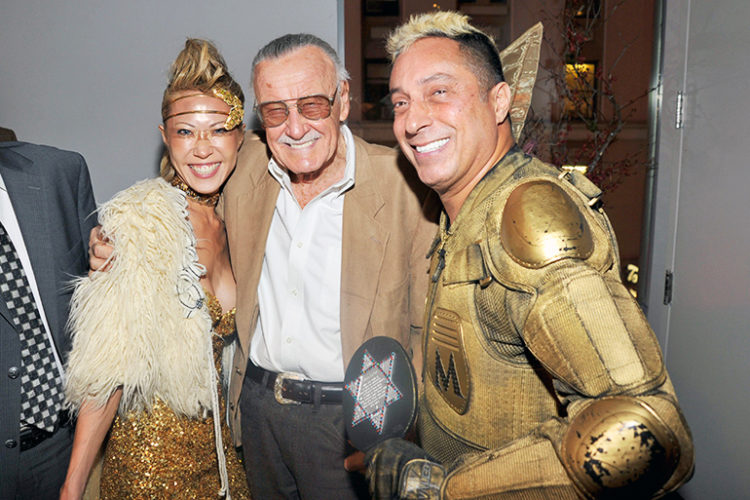
You must have had a ball doing that show.
Oh yeah, it was fun. They put us in some warehouse in downtown L.A. and called it the Superheroes’ Lair, where the 10 finalists slept. And he (Stan Lee) put us through all these tests each week, and each episode, to see who’d make it to the following week or would wind up on the chopping block. It was fantastic. I finally got the axe after the third episode, and I wanted to get the axe after the third episode, because I’d had enough of it. The next week, had I made it, was too Fear Factor-like for me.
They wanted us to crawl through a dark drainage tunnel, pitch black, telling us in advance that there are snakes, spiders and rats waiting for us at the other end. So I was happy that they threw me off the show because I wouldn’t have done that for a million dollars. And I didn’t care because my IMDB ratings were three or four times higher–because of the character and the schtick I did–than anyone else on the show, including the guy who eventually won it and made it to the very end. I got to cross over to certain fans who would’ve never known who Sir Ivan is: comic book fans, action hero fans, sci-fi fans, Stan Lee fans. They got to know, “Oh, Mr. Mitzvah is really this guy Ivan Wilzig and Ivan Wilzig is also a recording artist Sir Ivan. He also goes by another superhero name, Peaceman.”
Well, you kind of live like a superhero. You’re like Batman.
That’s what Stan Lee said on the show: “You’re the real life Bruce Wayne, the millionaire playboy philanthropist who helps people with your charitable acts.”
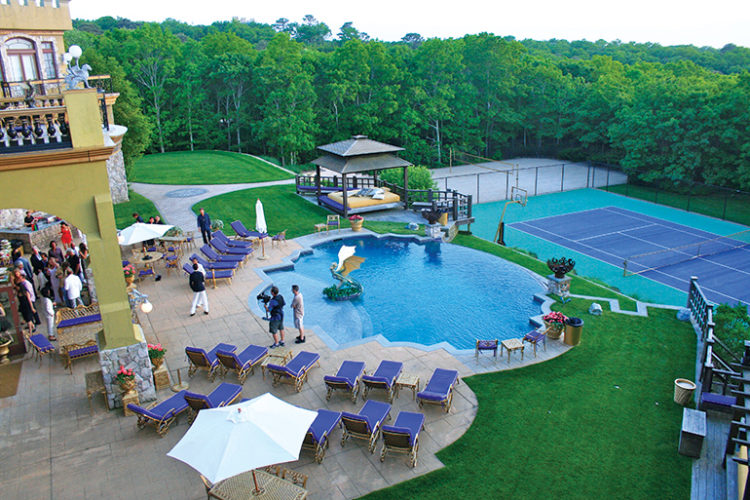
Your late mother Naomi Wilzig’s erotic art collection has become world famous. It makes me think she was less serious than your father.
I’m the one who turned her on to the erotic art. I had wanted her to buy me a piece. She was an antique collector and she was going to the Jacob Javitz Center for a huge antique show and I had just bought my first condo, and wanted to turn it into the ultimate bachelor pad. I didn’t tell my mother why I wanted the erotic art, but I just said, “Do me favor and buy my a piece of erotic art for my coffee table,” because I knew you could get them at antique shows.
And she goes, “What is it?”
And I go, “What is what?”
She goes, “What is it?”
“What is what? What are you asking me?”
She goes, “What is erotic art?”
I go, “What do you mean what is erotic art?” I said, “It’s erotic. Art.”
She goes, “I don’t know what it is.”
I said, “You’re almost 60 years old and you don’t know what erotic art is?”
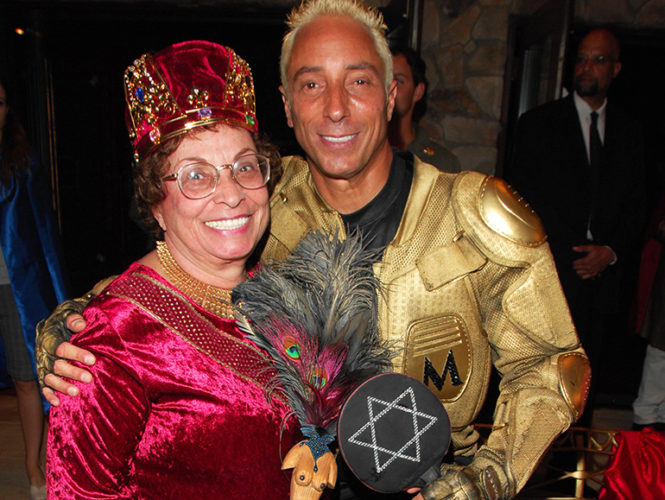
That’s not a comfortable conversation to have with your mom.
Exactly! I didn’t think I’d have to! That’s why I thought I could just throw it off nonchalantly.
Then she goes, “No.”
And I said, OK, I’m not used to having a conversation about sex with my mother, what kind of definition can I give her that’s not crude but gets the point across? So I thought I gave her the best definition in the world.
I said, “Ma, it’s sexual art but it’s not pornography. It’s more beautiful, it’s more intricate, it’s more detailed, it’s more mysterious. What you see doesn’t meet the eye. You have to turn it around, upside down, inside-out to see that there’s a hidden sex act going on. It reflects the morals and laws of society going back from any period of time–what was taboo, what was not taboo, what’s legal, what’s not legal, etcetera. Now you understand?”
She goes, “No.”
So I said, f__k it, she’s hopeless. How can she not understand it? I just gave her the best definition I thought in the world of erotic art. She didn’t know what it was and eventually she figured it out, and then she got obsessed with it and became the biggest collector in the United States. But the odd thing when you say she was the wild one in the family–she wasn’t. She came from an Orthodox Jewish family. That’s what made it so extreme for her to have gone in that direction.
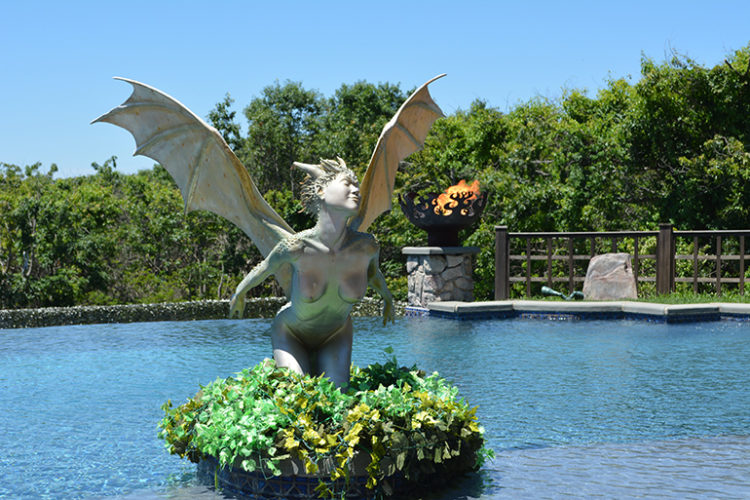
What did your father think?
As long as she kept it to herself, that was fine, but he didn’t want to know from it or get involved in it. Now there’re three major universities that are all taking a strong role in it: FIU, I took my mother’s board seat when she passed away, so I’m now on the Carta Board of Directors. The Kinsey Institute–the most respectable sex research group that’s owned by the University of Indiana–they do joint venture projects with us because they have plenty of erotic art.
My mother was the largest private owner of erotic art in the country, and the Kinsey Institute is the largest institutional owner of erotic art in the county, so they like to do joint venture projects because they have great respect for her work and her museum. The third one: Right now 80 percent of her collection is on loan to Humbolt University in Berlin where their sex education department is using the Naomi Wilzig Collection to teach the history of sex in the world. That’s how extensive it is, that for anything sexual you can possibly want to teach students, there’s at least one piece of art or more in her collection to exemplify what that theme is. It’s amazing.
What led you to give the way you do?
When you’re as lucky as I am to have had a very successful father who was a business genius and left me a small fortune, I’m obligated to help others. That’s what I was taught since I could walk and talk.
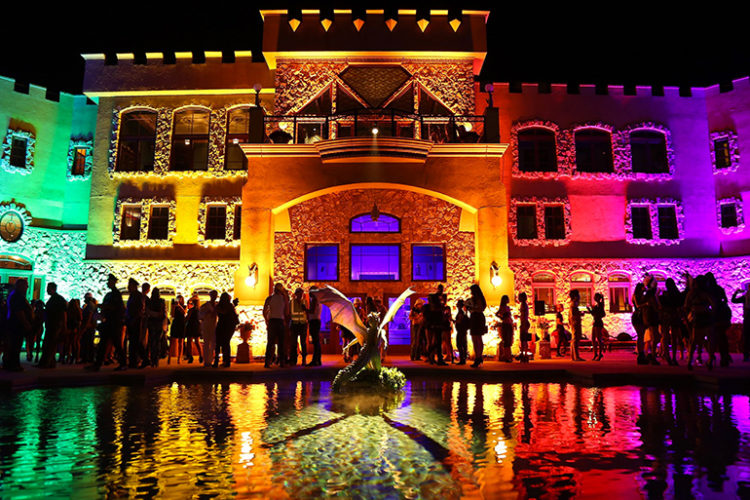
You support a lot of anti-bullying and PTSD causes through your Peaceman Foundation. Did you experience bullying growing up?
No. It was strictly a matter of my father being bullied by the Nazis and having 59 relatives perish during the Holocaust. And the reason I chose PTSD is because, while he was lucky enough to survive, he had certain classic symptoms of PTSD. It wasn’t even called that after the war. That name evolved later, but he still had nightmares, he still had flashbacks, occasional depression, and I decided, well, that will be the cause that I promote because, whether it’s the Holocaust, a different genocide, another traumatic terrorist attack, a rape, a murder, a car accident, any trauma that causes PTSD, I figured that’ll be my cause.
My father was able to overcome it, fortunately, and become one of the most successful businessmen in American history, but for the ones who couldn’t overcome it, who become drug addicts, who become alcoholics, who become depressed or suicidal–those are the ones we try to help. So that’s why I gave a lot of the funds raised to help either soldiers coming back from Iraq and Afghanistan, or members of the LGBT community because in both those cases they have the highest suicide rates.
Do you give to any local charities?
Yeah. I’ve given to them all at one point or another. Years ago if I went to something at the Parrish museum I’d give something there. Southampton Hospital. We had a charity for the Riverhead Foundation to save the sea life. If a seal or a whale or a turtle gets washed ashore, they rescue the local sea life. We did a pediatric dental charity fundraiser. I support an organization called MAPS, which is the Multidisciplinary Association for Psychedelic Studies–they’re the ones who’ve gotten marijuana legalized for medical purposes and they’re the ones who use MDMA. Ecstasy actually has been one of the most helpful drugs for those suffering from PTSD. You know how our government treats ecstasy. You’ll go to jail for 100 years, meanwhile it’s keeping people from committing suicide. It’s a wonderful organization run by a Harvard PhD, a guy named Rick Doblin.
If you could dine with anyone, alive or dead, for a Hamptons dinner party, who would it be?
Maybe Steven Spielberg or Madonna.
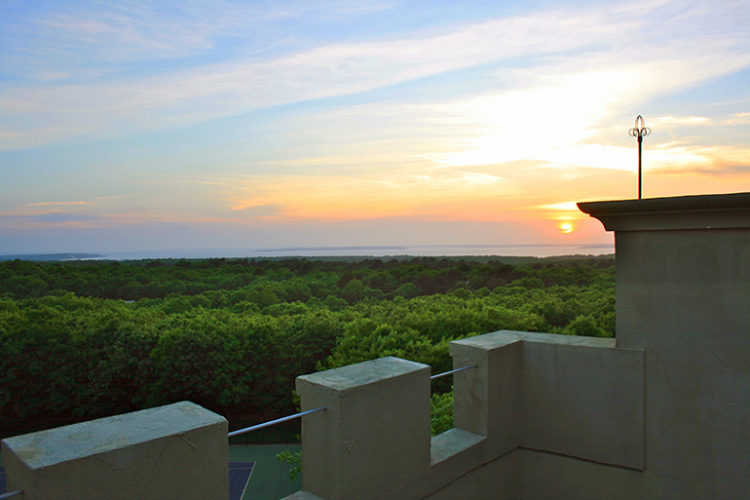
Describe your perfect day on the East End in detail.
What I do pretty much every Sunday–have between 50 and 100 people over for a pool party and barbecue, and give them a tour of the castle ending with a sunset from the Great Hall balcony.
On top of Who Wants to Be a Superhero?, you did another reality show, Single in the Hamptons. Can you tell me about it?
It was called Manhattan on the Beach. They changed the name later to Single in the Hamptons and launched an entire franchise based on the success of that season I was on. They followed us around all summer, five different people. Mina [Otsuka, Sir Ivan’s longtime partner] and I were one of the couples they followed around. Yeah, that was a fun, great program.
What’s your proudest achievement?
In terms of personal achievement, it was reinventing John Lennon’s “Imagine” as a dance record twice and having it chart internationally both times. It brought that message of peace and love to an entirely new generation that wasn’t even born when John Lennon did the original slow, iconic ballad. From a global point of view, in terms of what will surely be recognized as a major contribution to humanity, it will be the book on my father, because of it being not only an incredible survivor story, but the most inspiring immigrant story for anyone of any nationality or any religion coming to America. There are a lot of lessons to be learned by that book and a lot of positive inspiration and hope that will come from people reading it.
Do you have any other favorite spots out here, some place you like to go?
Sag Harbor because of the boats. It’s unique. Because of it being on the water, the boats. It’s just a nice town.
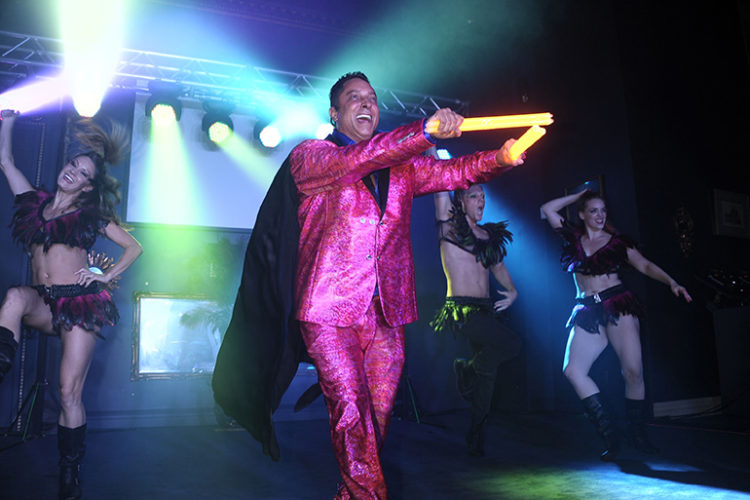
What’s going on with your music right now?
Waiting on a–it’s being edited as we speak–a music video that was directed by a famous guy, he did two of my other music videos. His name is Rudi Dolezal. He’s an Austrian director.
Your home is the ultimate nightclub when you make it so. Do you have any other favorite nightspots out here?
I usually visit, the name changes every year, but the original Tavern location [in Southampton] is one of the closest places I’ll go if I do go out for a particular DJ, though I do have my own nightclub inside. And I go to whatever new restaurant or club they have inside the Capri Hotel every year for the same reason: It’s close and I usually know the people involved. Those are the two. They’re pretty much the only places around these days. A lot of the action has moved to Montauk, unfortunately, which is too far of a drive for me, unless it’s during the week.
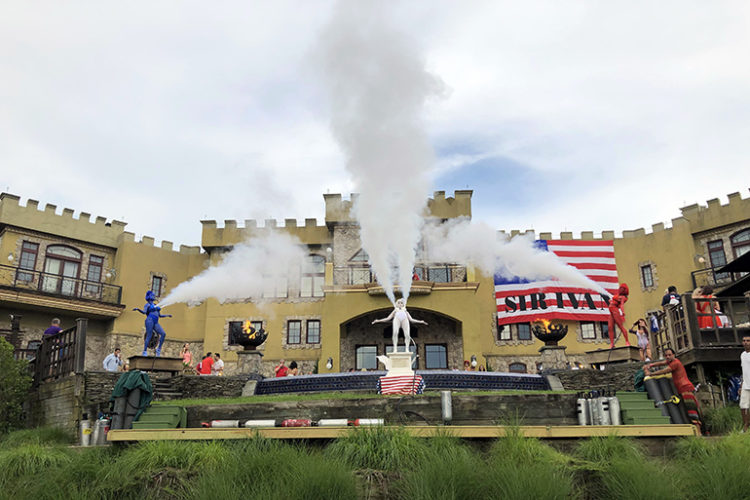
What’s your experience with the Hamptons changing over the years since 1974?
The traffic has gotten worse. The nightlife is not as good, but there’re a lot more fine restaurants than ever.
What do people need to know, should they be lucky enough to attend one of your parties?
If I have a theme, like I just did last week, that’s a lingerie, pajama or silk robe pajama party and people come in regular street clothes, they have a choice at the gate: They can strip down to their underwear, their bra, panties and underwear, or leave. It’s all in the details, throwing a good party, so that’s why you have to insist upon certain things, and somebody has to be a good sport about it.
